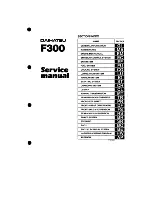
As you dry the car, inspect it for
chips and scratches that could allow
corrosion to start. Repair them with
touch-up paint (see page
).
When you have washed and rinsed
the whole exterior, dry it with a
chamois or soft towel. Letting it
air-dry will cause dulling and water
spots.
Check the body for road tar, tree
sap, etc. Remove these stains with
tar remover or turpentine. Rinse it
off immediately so it does not
harm the finish. Remember to re-
wax these areas, even if the rest of
the car does not need waxing.
Wash the car using the water and
detergent solution and a soft-
bristle brush, sponge, or soft cloth.
Start at the top and work your way
down. Rinse frequently.
Fill a bucket with cool water. Mix
in a mild detergent, such as
dishwashing liquid or a product
made especially for car washing.
Rinse the car thoroughly with cool
water to remove loose dirt.
Only use the solvents and cleaners
recommended in this Owner’s
Manual.
Wash your car in a shady area, not in
direct sunlight. If the car is parked in
the sun, move it into the shade and
let the exterior cool down before you
start.
Frequent washing helps preserve
your car’s beauty. Dirt and grit can
scratch the paint, while tree sap and
bird droppings can permanently ruin
the finish.
208
Washing
Exterior Care
Appearance Care
207
Chemical solvents and strong cleaners
can damage the paint, metal, and
plastic on your car.
Although almost all exterior panels on
your Honda are made of hardened
aluminum, they may dent more easily
than steel under some conditions.
Exercise care when leaning on or over
any part of the body.
















































